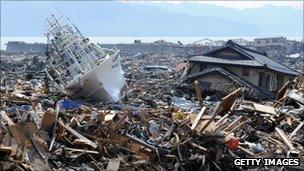Noda unveils Japan cabinet as he seeks to boost growth
- Published

There has been growing discontent in Japan about the government's handling of the quake and tsunami
Japan's new Prime Minister Yoshihiko Noda has unveiled his cabinet, which will be charged with rebuilding the country and boosting growth.
Japan has been trying to rebuild after the damage caused by the earthquake and tsunami earlier this year.
At the same time, Japan's economy is in recession.
Jun Azumi has been appointed finance minister, while Motohisa Furukawa has been given charge of the economics portfolio.
Yoshio Hachiro has been named as the new trade minister by Mr Noda.
Unknown quantity?
Mr Noda took over Japan's top job after his predecessor Naoto Kan resigned following public anger about his handling of March's quake and tsunami.
A slowdown in Japan's economy further fuelled feeling against the government.
It meant the decision over who would take charge of key ministries such as finance, economics and trade had been keenly watched.
However, the announcements, especially that of Mr Azumi, who had not been considered a front runner, have raised fresh questions.
"Appointment of a relatively unknown person raises more questions than answers and heightens a sense of uncertainty," said Koji Fukaya of Credit Suisse Securities.
Analysts also said they were not sure about his stance on financial policies.
"He [Mr Azumi] has not made many comments about intervention or fiscal policies," said Ayako Sera of Sumitomo Trust and Banking.
Financial policy
The new cabinet will have to hit the ground running given the overall health of the country's economy, which has now contracted for three consecutive quarters.
At the same time, a rising currency is threatening to cause further damage to the nation's export-dependent manufacturing sector.
During his time as in charge of the finance ministry in the previous cabinet, Mr Noda had voiced his concerns about the rising currency.
Japanese authorities had intervened twice in the foreign exchange markets in a bid to weaken the currency.
Analysts said that given that Mr Noda has appointed a relatively inexperienced candidate as the finance minister, he was likely to continue with the policies he had put in place.
"If he were a veteran lawmaker, the new finance minister might have clashed with Noda on some issues," said Koichi Haji of NLI Research Institute.
"But that appears not to be the case and the choice is likely a sign Noda will pursue his own policies on economic and fiscal issues." he added.
Nuclear power
Another key area that the new cabinet needs to address immediately is the power situation in the country.
Japan relies on nuclear power as major source of its electricity supply.
The 11 March earthquake and tsunami caused substantial damage to the Fukushima Daiichi nuclear plant, which resulted in other nuclear power stations in the country being shut down as well.
That resulted in a shortage of power supply which could last for three to five years according to Japan's former economics minister Kaoru Yosano.
At the same time, radiation leaks at the Fukushima Daiichi plant have raised concerns about the safety of nuclear energy.
Although prime minister Noda has not been as vocal as his predecessor about nuclear energy, he has acknowledged that building new reactors will be next to impossible, given the public's worries about safety.